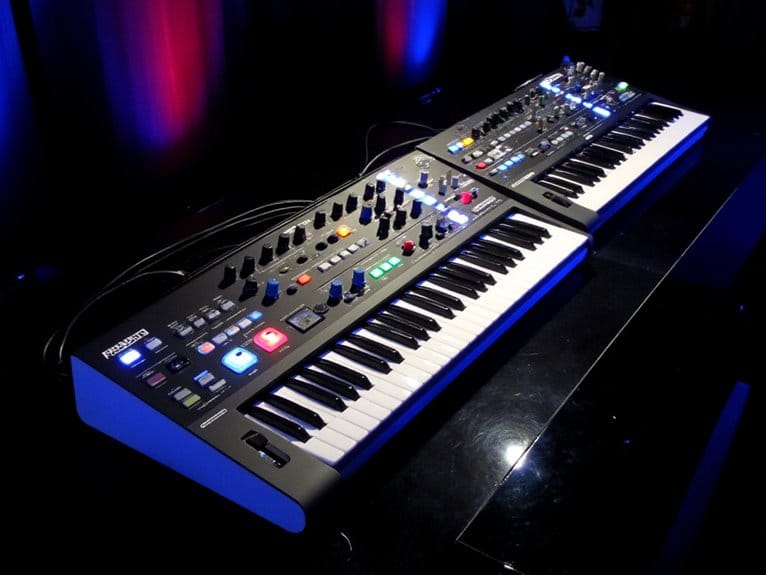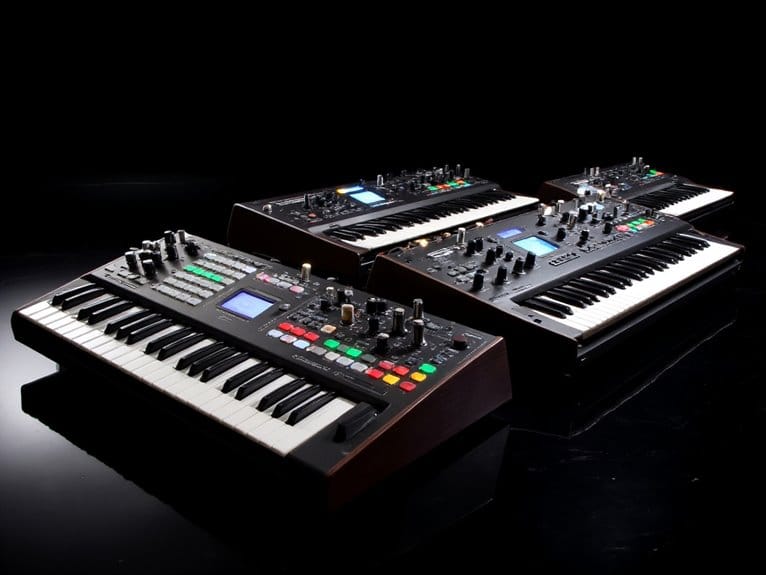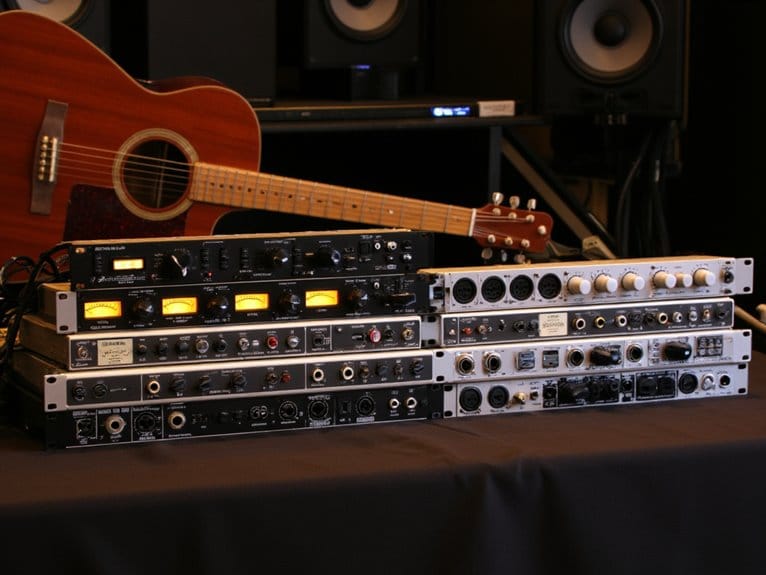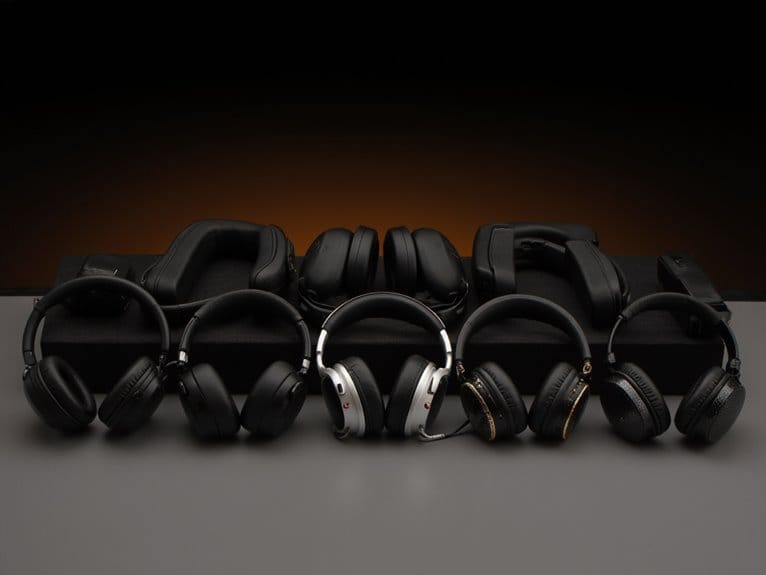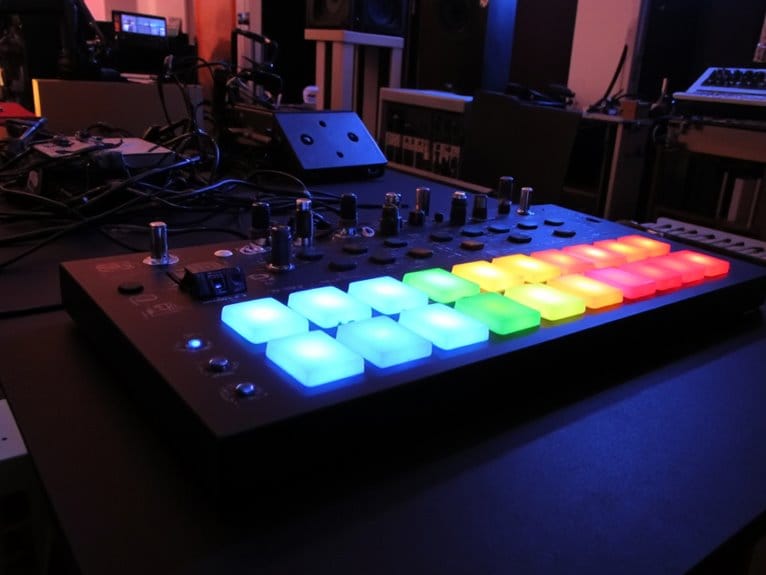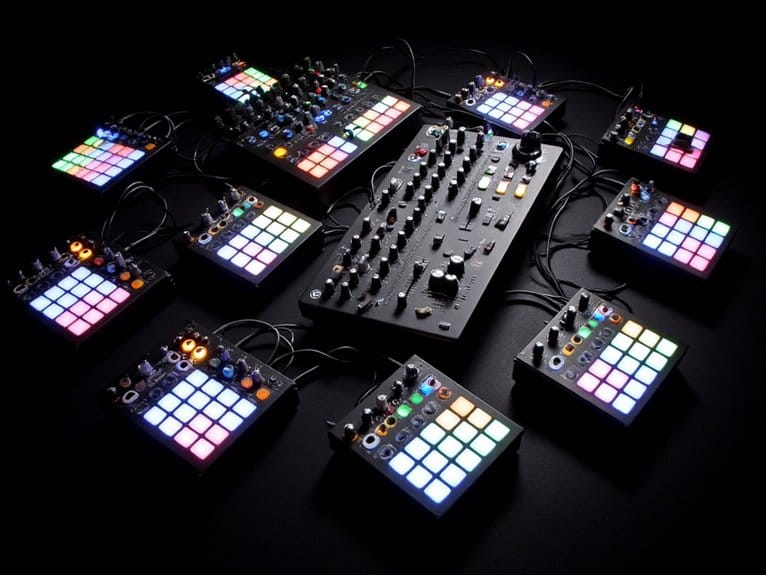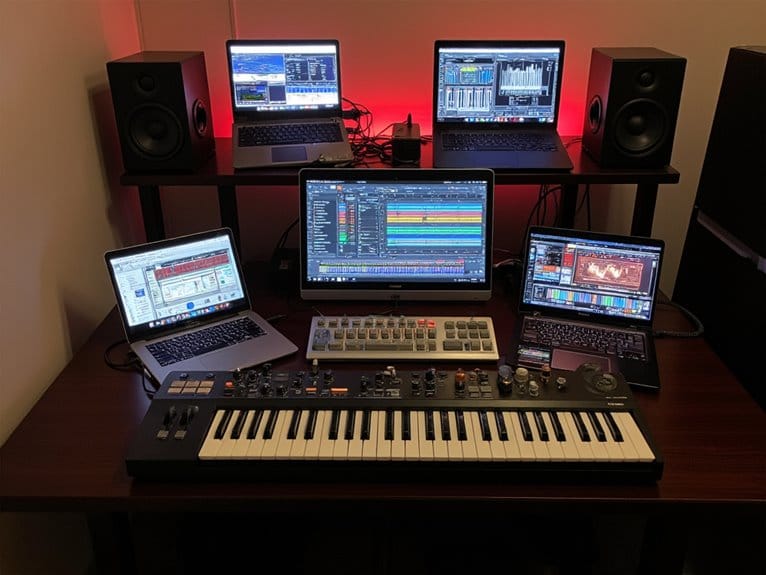10 Best 49-Key MIDI Controllers for Music Production
After testing dozens of controllers, I’ve identified the top 49-key MIDI keyboards for 2025, with standouts including Novation Launchkey 49 MK4 for seamless DAW integration with polyphonic aftertouch drum pads. The Arturia KeyLab Essential mk3 excels with creative Scale and Chord modes, while the M-Audio Oxygen Pro 49 delivers professional-grade features including semi-weighted keys and extensive MIDI control. Continue below for detailed breakdowns of each controller’s strengths and ideal use cases.
We are supported by our audience. When you purchase through links on our site, we may earn an affiliate commission, at no extra cost for you. Learn more.
Notable Insights
- M-Audio Keystation 49 MK3 offers plug-and-play connectivity with comprehensive software bundle, ideal for budget-conscious beginners.
- Novation Launchkey 49 MK4 provides seamless DAW integration with semi-weighted keys and polyphonic aftertouch drum pads.
- M-AUDIO Oxygen Pro 49 delivers professional features including aftertouch, 16 RGB drum pads, and Native Kontrol Standard integration.
- Arturia KeyLab Essential mk3 combines traditional keyboard with Scale/Chord Modes, arpeggiator, and 2000 Analog Lab V presets.
M-Audio Keystation 49 MK3 USB MIDI Keyboard Controller
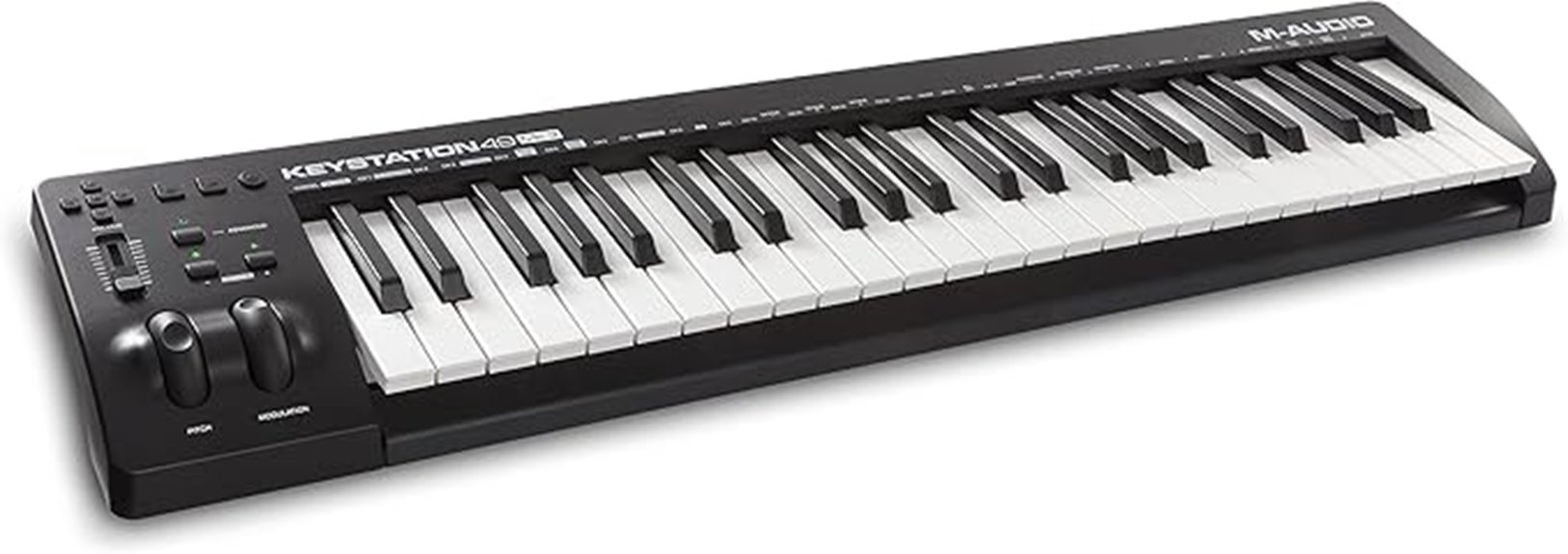
The M-Audio Keystation 49 MK3 emerges as a straightforward workhorse that prioritizes essential functionality over flashy features, making it an ideal entry point for budget-conscious producers who need reliable MIDI control without breaking the bank. You’ll appreciate the plug-and-play connectivity that works seamlessly across Mac, PC, and iOS devices, eliminating the frustration of driver installations that can derail your creative momentum. The velocity-sensitive keys deliver natural playing feel with clean MIDI output, while the included software bundle—featuring Ableton Live Lite, MPC Beats, and several virtual instruments—provides immediate production capabilities right out of the box, though you might eventually crave additional MIDI output ports for expanded connectivity options.
Best For: Budget-conscious producers and beginners who need reliable MIDI control with essential functionality and immediate production capabilities through included software.
Pros:
- Plug-and-play connectivity across Mac, PC, and iOS devices with no driver installation required
- Velocity-sensitive keys provide natural playing feel with clean MIDI output
- Comprehensive software bundle includes Ableton Live Lite, MPC Beats, and multiple virtual instruments for immediate music production
Cons:
- Lacks MIDI output ports for expanded connectivity with external hardware
- Limited to essential features without advanced controls or customization options
- May require upgrading to more sophisticated controllers as production skills advance
Novation Launchkey 49 MK4 MIDI Keyboard Controller with DAW Integration
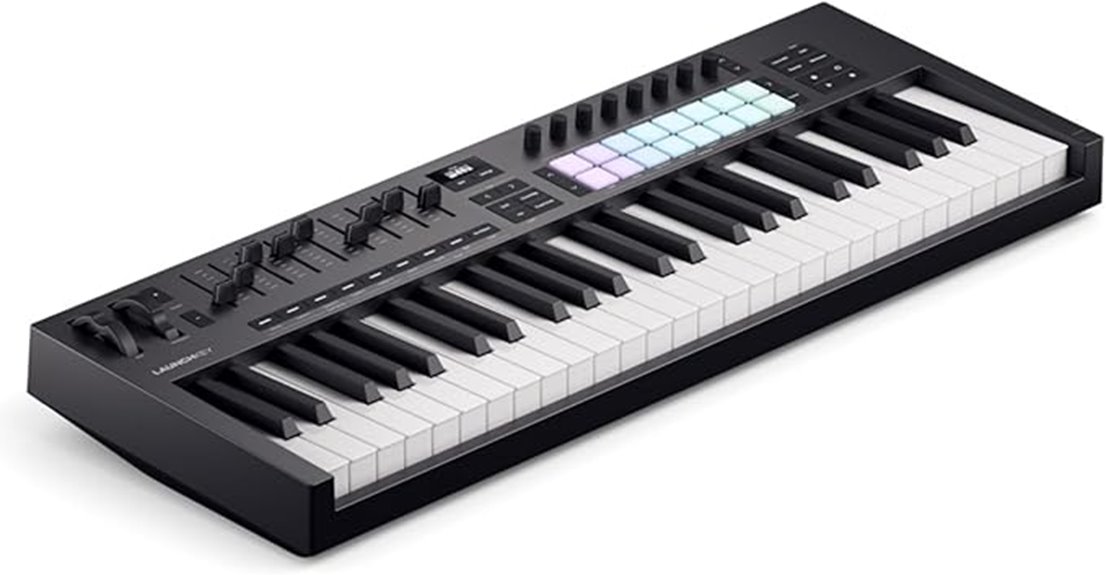
Producers seeking seamless DAW integration will find the Novation Launchkey 49 MK4 particularly compelling, as this controller transforms your workflow with instant access to mixer controls, device parameters, and clip launching across major platforms like Ableton Live, Logic Pro, and FL Studio. The semi-weighted keys provide decent expression, though I’ll admit the velocity sensitivity can feel overly touchy at times, requiring some adjustment to your playing style. What sets this controller apart are the FSR drum pads with polyphonic aftertouch, which respond beautifully to nuanced finger work, and the intuitive Chord and Scale modes that’ll help you navigate unfamiliar territories. The included software bundle sweetens the deal considerably.
Best For: Producers and musicians who want seamless DAW integration with expressive controls, especially those working with Ableton Live, Logic Pro, or FL Studio who value intuitive chord/scale modes and responsive drum pads.
Pros:
- Excellent DAW integration with instant access to mixer controls, devices, and clip launching across major platforms
- High-quality FSR drum pads with polyphonic aftertouch that respond well to nuanced playing techniques
- Comprehensive software bundle included with Ableton Live 12 Lite and various instruments and effects
Cons:
- Velocity sensitivity can be overly touchy and may require adjustment to playing style
- Key feel may not suit all users despite being semi-weighted
- Software bundle requires creating multiple accounts and agreeing to various data permissions
M-AUDIO Oxygen Pro 49 Key USB MIDI Keyboard Controller
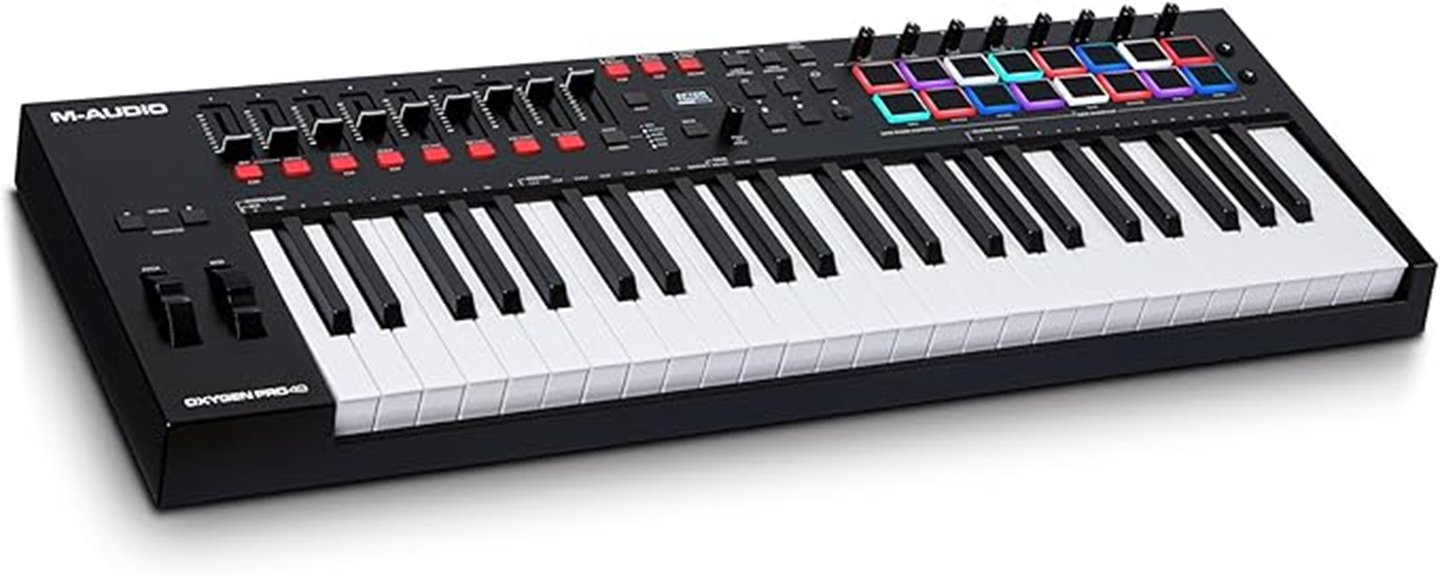
Studio producers seeking thorough MIDI control with professional-grade features will find their match in the M-AUDIO Oxygen Pro 49, a controller that bridges the gap between basic home setups and high-end studio configurations. You’ll appreciate the 49 velocity-sensitive, semi-weighted keys with aftertouch, alongside 16 RGB backlit drum pads that respond dynamically to your touch. The eight assignable knobs and nine faders provide extensive DAW control, while Native Kontrol Standard integration guarantees seamless compatibility with Native Instruments libraries. The included software bundle features MPC Beats, Ableton Live Lite, and AIR Music Tech instruments, delivering immediate production value for your studio workflow.
Best For: Studio producers and music creators who need comprehensive MIDI control with professional features, seamless DAW integration, and both keyboard and drum pad functionality for versatile music production.
Pros:
- 49 velocity-sensitive, semi-weighted keys with aftertouch and 16 RGB backlit drum pads provide excellent tactile control for both melodic and rhythmic elements
- Native Kontrol Standard (NKS) integration and auto-mapping functionality ensure seamless compatibility with major DAWs and Native Instruments libraries
- Comprehensive software bundle includes MPC Beats, Ableton Live Lite, and AIR Music Tech virtual instruments for immediate production value
Cons:
- Customer reviews indicate conflicting information about aftertouch availability, with some noting its absence as a drawback
- Basic pitch and modulation wheels may limit expressive control compared to more advanced controllers
- At 9.3 pounds, the controller may be less portable than lighter alternatives for mobile production setups
Arturia KeyLab Essential mk3 49 Key USB MIDI Keyboard Controller
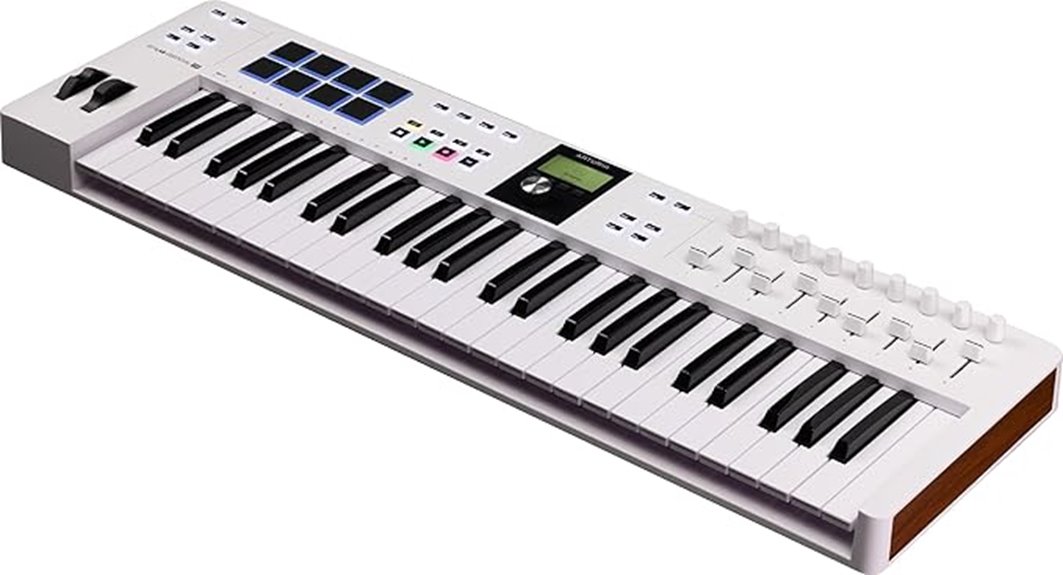
Creative producers who crave hands-on control will find the Arturia KeyLab Essential mk3 particularly compelling, since it combines traditional keyboard functionality with modern composition tools like Scale Mode, Chord Mode, and an integrated arpeggiator that streamline the songwriting process. You’ll appreciate the RGB-backlit velocity-sensitive pads paired with the 2.5″ LCD screen that provides real-time feedback during sessions. The included Analog Lab V delivers 2000 presets spanning vintage synthesizers, modern hybrids, and orchestral sounds, while custom DAW scripts guarantee seamless integration with Ableton Live, Logic Pro X, and FL Studio for enhanced workflow efficiency.
Best For: Creative producers and songwriters who want hands-on control with modern composition tools like Scale Mode, Chord Mode, and arpeggiator functionality, plus seamless DAW integration for streamlined workflow.
Pros:
- Comprehensive software package including Analog Lab V with 2000 presets, premium piano instruments, and subscriptions to Loopcloud and Melodics
- Modern creative features like Scale Mode, Chord Mode, and built-in arpeggiator make composition and songwriting more intuitive
- RGB-backlit velocity and pressure-sensitive pads with 2.5″ LCD screen provide excellent tactile control and real-time feedback
Cons:
- Limited to 49 keys which may feel restrictive for pianists or those needing extended range
- USB-only connectivity lacks traditional MIDI ports for connecting to hardware synthesizers or older equipment
- Relies heavily on computer and software integration, making it less useful as a standalone instrument
Nektar Impact GX49 USB MIDI Controller Keyboard

The Nektar Impact GX49 strikes an impressive balance between affordability and functionality, making it particularly appealing for beginners who need reliable MIDI control without the financial commitment of premium models. At around $100, you’re getting 49 full-size synth-action keys with surprisingly good feel, pitch bend and modulation wheels, plus excellent DAW integration that works seamlessly with most popular software. The compact 31-inch footprint fits perfectly in smaller studios, while the included Bitwig Studio 8-track software adds immediate value. Though you’ll encounter some transport control quirks with Ableton Live, the overall build quality and performance easily surpass similarly-priced competitors like the Alesis V49.
Best For: Beginners and budget-conscious musicians who need a reliable, compact MIDI controller with excellent DAW integration and don’t want to invest heavily in premium features.
Pros:
- Excellent build quality and key feel that surpasses similarly-priced competitors like the Alesis V49
- Compact 31-inch footprint perfect for small studios with seamless DAW integration for most popular software
- Great value at $100 with included Bitwig Studio 8-track software and sound content package
Cons:
- Transport controls require manual configuration and have compatibility issues with Ableton Live
- Keys may feel less durable compared to higher-end models
- Velocity sensitivity can occasionally be faulty depending on DAW integration
midiplus AK490 MIDI Keyboard Controller

Budget-conscious producers seeking essential MIDI functionality without unnecessary frills will find the midiplus AK490 MIDI Keyboard Controller delivers exactly what you need, nothing more. This straightforward 49-note controller features velocity-sensitive piano-style keys, pitch and modulation wheels, and octave up/down buttons for basic performance control. You’ll get MIDI out via DIN jack, sustain pedal connectivity (though you’ll need to buy the pedal separately), and USB cable included for immediate computer connection. While it won’t win any awards for advanced features or premium build quality, the AK490 handles fundamental MIDI duties competently at an entry-level price point that won’t devastate your studio budget.
Best For: Budget-conscious producers and beginners who need basic MIDI keyboard functionality for simple music production and performance without requiring advanced features.
Pros:
- Affordable entry-level price point that fits tight studio budgets
- Essential features including velocity-sensitive keys, pitch/modulation wheels, and octave controls
- Immediate plug-and-play connectivity with included USB cable and MIDI DIN output
Cons:
- Sustain pedal sold separately despite having sustain jack connectivity
- Basic build quality without premium materials or construction
- Limited advanced features compared to higher-end MIDI controllers
Nektar Impact LX49+ USB MIDI Controller Keyboard
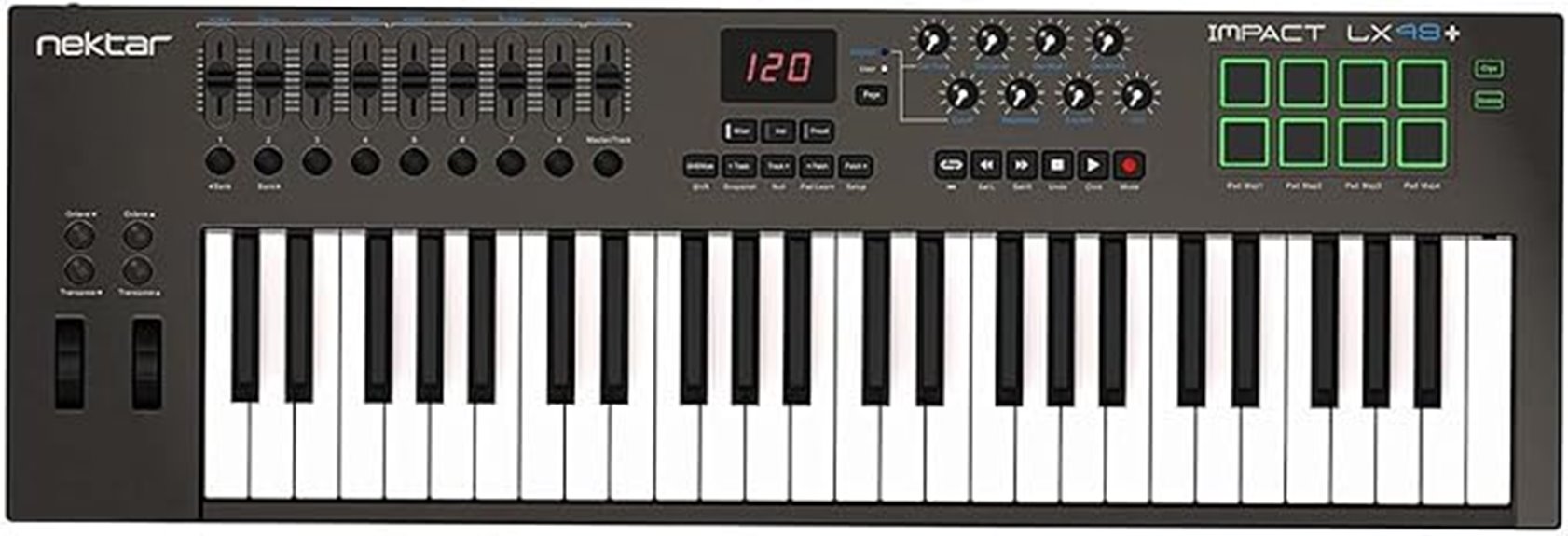
Musicians seeking exceptional DAW integration without breaking the bank will find their perfect match in the Nektar Impact LX49+, a controller that prioritizes software compatibility over flashy hardware aesthetics. You’ll appreciate how this 7.04-pound unit automatically maps transport controls and smart functions across popular DAWs like Logic Pro X and Studio One, eliminating the tedious setup processes that plague many competitors. The 49 velocity-sensitive keys, eight backlit drum pads, and nine faders provide sufficient hands-on control for serious production work, while the included Bitwig Studio and Cherry Audio plugins sweeten the $200 investment considerably.
Best For: Musicians and producers who prioritize seamless DAW integration and workflow efficiency over premium hardware aesthetics, particularly those working with Logic Pro X, Studio One, or other compatible DAWs in home studio environments.
Pros:
- Exceptional DAW integration with automatic mapping of transport controls and smart functions across popular software
- Comprehensive control surface featuring 49 velocity-sensitive keys, 8 backlit drum pads, 9 faders, and 8 knobs for hands-on production
- Excellent value proposition with included Bitwig Studio DAW and Cherry Audio plugin bundle at a reasonable price point
Cons:
- Hardware build quality is adequate but not top-tier compared to higher-end competitors
- Some users report loading issues with the included Bitwig software
- Limited to synth-action keys rather than weighted or semi-weighted action preferred by some keyboardists
M-AUDIO Oxygen 49 Key USB MIDI Keyboard Controller (MKV)
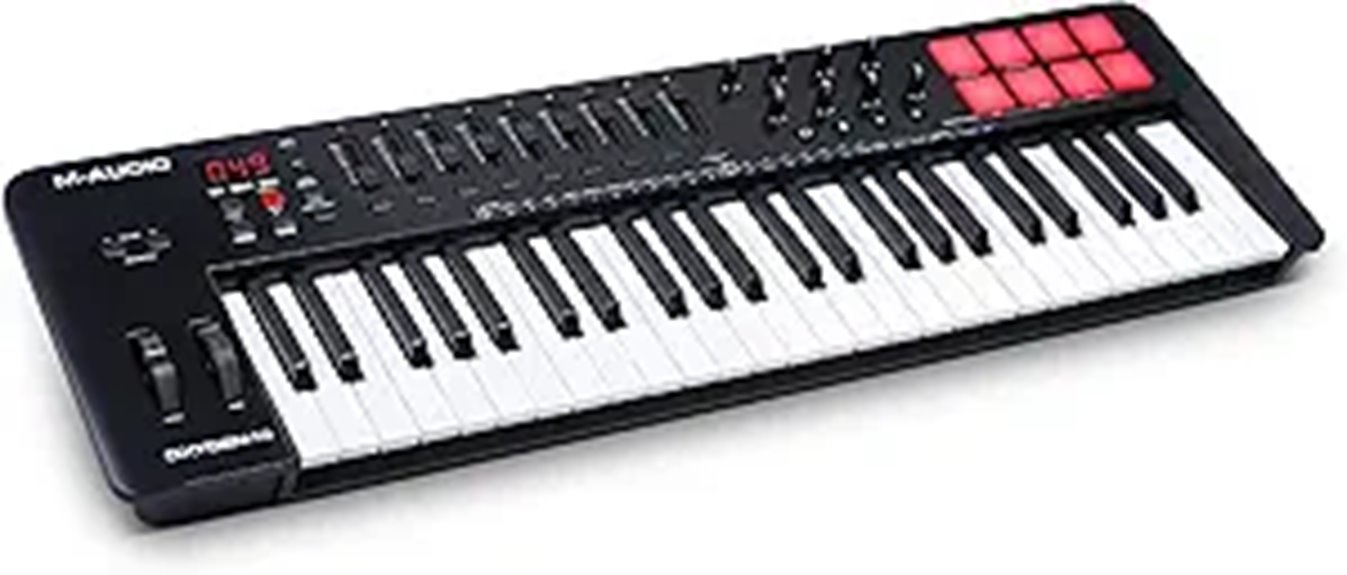
Smart Chord and Scale Modes paired with eight backlit drum pads make the M-AUDIO Oxygen 49 MKV an exceptional choice for producers who want to streamline their beat-making workflow without sacrificing creative control. You’ll appreciate the velocity-sensitive full-size keys, which feel responsive enough for most playing styles, though they’re not weighted if that’s your preference. The eight assignable knobs and nine faders provide plenty of hands-on control for mixing, while the included software bundle—featuring MPC Beats, Ableton Live Lite, and AIR Music Tech instruments—gives you everything needed to start producing immediately. Auto-mapping with major DAWs keeps setup frustration to a minimum.
Best For: Beginner to intermediate producers and beat makers who want a feature-rich MIDI controller with comprehensive software bundle and streamlined workflow capabilities.
Pros:
- Smart Chord and Scale Modes with backlit drum pads enhance creative workflow and beat-making efficiency
- Comprehensive included software suite (MPC Beats, Ableton Live Lite, AIR Music Tech instruments) provides immediate production capability
- Auto-mapping with major DAWs and extensive assignable controls (8 knobs, 9 faders) minimize setup time and maximize hands-on control
Cons:
- Keys are not weighted, which may disappoint users seeking a more authentic piano feel
- Some compatibility issues reported with certain DAW software despite auto-mapping claims
- Lightweight construction, while portable, may feel less premium compared to heavier, more robust alternatives
Samson Carbon 49 Key USB MIDI DJ Keyboard Controller

When space constraints meet serious music production needs, I’ve found that the Samson Carbon 49 delivers an impressive balance of portability and professional features that makes it particularly well-suited for mobile producers and compact studio setups. The velocity-sensitive, semi-weighted keys provide surprisingly expressive playability despite the controller’s compact 11 x 33.25 x 5-inch footprint, while the assignable data encoder, volume slider, and edit key let you control 14 parameters without cluttering your workspace. What sets this controller apart is its integrated iPad slot and iOS compatibility, making it genuinely portable for on-the-go composition, though you’ll need to work around the somewhat short USB cable.
Best For: Mobile producers and musicians who need a portable, feature-rich MIDI controller for compact studios, live performances, and iPad-based music production.
Pros:
- Compact and lightweight design with integrated iPad slot for exceptional portability
- Semi-weighted, velocity-sensitive keys provide expressive playability in a small form factor
- Comprehensive control options with assignable parameters, pitch bend/mod wheels, and included professional software bundle
Cons:
- Less sensitive drum pads limit percussion programming capabilities
- Short USB cable restricts placement flexibility and may require extension
- Limited to 49 keys, which may feel restrictive for players accustomed to full-size keyboards
Factors to Consider When Choosing 49 Key Midi Controllers
When I’m evaluating 49-key MIDI controllers for my studio setup, I’ve learned that five critical factors separate the exceptional units from the merely adequate ones. The key action and feel directly impacts your playing experience, while DAW integration features determine how seamlessly you’ll workflow with your preferred software, and the pad and control layout affects your creative efficiency during production sessions. I also consider the software bundle value since quality included plugins can justify higher prices, plus connectivity and portability features that match my specific studio requirements and mobile production needs.
Key Action and Feel
Although I’ve tested dozens of MIDI controllers over the years, I’ll admit that the key action remains one of the most subjective yet essential factors in determining whether you’ll actually enjoy playing your 49-key controller. Synth-action keys, which I prefer for electronic music production, offer fast response times and minimal resistance, making them ideal for rapid sequences and quick chord progressions. Semi-weighted keys provide a middle ground, delivering more piano-like responsiveness without the full heft of acoustic piano keys. Velocity sensitivity is non-negotiable in my book, as it transforms mechanical key presses into expressive performances that respond dynamically to your touch intensity. Aftertouch capability adds another layer of control, allowing pressure-based modulation after striking notes.
DAW Integration Features
Three fundamental DAW integration features can make or break your workflow efficiency, and I’ve learned this lesson through countless hours of fumbling with poorly mapped controllers that seemed designed to frustrate rather than inspire creativity. First, I prioritize multi-DAW compatibility because switching between Ableton Live, Logic Pro X, and FL Studio shouldn’t require relearning my entire setup. Auto-mapping functionality for transport controls, faders, knobs, and pads eliminates tedious manual configuration, letting me focus on music rather than technical gymnastics. I also value advanced integration standards like Native Kontrol Standard, which provides direct preset control across compatible software instruments. Finally, bundled software packages add significant value, often including complementary plugins that enhance the overall production experience beyond the hardware investment.
Pad and Control Layout
The physical geography of your controller’s surface determines how intuitively you’ll navigate creative ideas, and after years of wrestling with awkwardly positioned knobs that interrupted my flow mid-composition, I’ve developed strong opinions about what works. When evaluating pad and control layouts, I prioritize velocity-sensitive drum pads positioned within comfortable reach, typically 8 to 16 backlit units that respond dynamically to your touch intensity. The sweet spot includes 8 to 16 assignable knobs paired with 8 to 9 faders, strategically placed to minimize hand movement during sessions. I’ve found that dedicated pitch bend, modulation, and transport buttons greatly streamline workflow, while smart chord modes can transform complex arrangements into manageable performances, making even intricate compositions accessible.
Software Bundle Value
Since I’ve spent countless hours downloading, installing, and testing bundled software that ranges from game-changing to utterly forgettable, I can tell you that the included software package often determines whether your controller purchase feels like a steal or a disappointment. I prioritize controllers offering diverse software ecosystems, including established DAWs like Ableton Live and MPC Beats, thorough virtual instruments, and production tools that collectively save hundreds of dollars for beginners. Auto-mapping capabilities prove essential, eliminating tedious manual configuration when switching between preferred platforms. I particularly value packages including structured learning resources like Melodics lessons, which accelerate production technique development. Controllers promising ongoing software updates and expansions maintain relevance longer, though I’ve learned to evaluate current offerings rather than banking on future promises that manufacturers don’t always deliver.
Connectivity and Portability
Whether you’re setting up a permanent home studio or hauling your gear to jam sessions across town, connectivity options and portability features will make or break your daily workflow with any 49-key MIDI controller. I always examine USB-B connectors for direct computer connections, MIDI out ports for hardware integration, and Bluetooth capability for wireless convenience during mobile production sessions. Weight matters more than you’d think—controllers ranging from 2 to 9 pounds with approximately 31-inch widths strike the best balance between playability and transportability. USB bus-powered models eliminate extra power supplies, which I’ve learned saves both outlet space and cable management headaches. Cross-platform compatibility across Windows, macOS, iOS, and Android guarantees seamless operation regardless of your preferred recording environment or device.
Build Quality Standards
Durability separates professional-grade MIDI controllers from flimsy plastic disappointments that’ll leave you scrambling for replacements after six months of regular use. I’ve learned the hard way that premium materials like metal chassis, reinforced knobs, and quality plastic compounds directly correlate with longevity, especially when you’re hauling gear between studios and gigs.
Velocity-sensitive keys and pads aren’t just features—they’re essential for capturing musical expression and dynamics. Semi-weighted keys offer that sweet spot between piano feel and portability, though they do add weight to your setup.
The tactile feedback from controls matters more than most realize. Solid, responsive knobs and faders improve workflow efficiency, while mushy buttons slow down your creative process during critical production moments.
On a final note
I’ve analyzed these eight exceptional 49-key controllers, each offering distinct advantages for different production styles and budgets. Whether you’re prioritizing seamless DAW integration like the Launchkey 49 MK4, thorough control surfaces like the Oxygen Pro 49, or budget-friendly reliability with the Carbon 49, there’s a controller that’ll match your workflow perfectly. Consider your specific needs, software compatibility, and long-term production goals before making your final decision.

